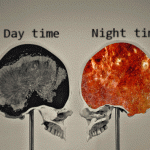Getting a good night of sleep is one of the cornerstones of health. After all, sleep is when your body is able to repair and heal. However, sleep deprivation is such a chronic condition these days that you might not even realize you suffer from it.
Our inability to disconnect – from cell phones, tablets, laptops, television, music players – all can result in a lack of rest. Science has now established that a sleep deficit can have serious, far reaching effects on your health. For example, interrupted or impaired sleep can; weaken your immune system, accelerate tumor growth, impair your memory, and decrease your performance on physical and mental tasks. When your circadian rhythms are disrupted, your body produces less melatonin and has less ability to fight cancer (melatonin helps suppress free radicals that can lead to cancer). This is why tumors grow faster when you sleep poorly.
What can you do to help get a better night of sleep?
For starters, avoid resorting to sleeping pills. The latest research shows that sleeping pills are associated with more than 320,000 premature deaths annually in the United States. They are highly addictive and are not intended for long-term use, as they have significant risks and side effects. These drugs also produce significant effects on memory and behavior. Severe memory impairment and amnesia, nervousness, confusion, hallucinations, bizarre behavior, and extreme irritability and aggressiveness may result. They have also been shown to increase feelings of depression and thoughts of suicide. Most important to note is there are now 18 population-based studies that show a clear link to the use of sleeping pills and increased mortality risk.
You are not getting normal sleep when you take a sleeping pill – in fact they actually impair the ability to reach the deeper stages of sleep. That is why people who take them report feeling sluggish and lethargic upon awakening. It’s also one of the reasons these drugs can increase mortality so significantly. However, it’s not just sleeping pills that are the problem – many drugs, both prescription and over-the-counter, may adversely effect sleep.
As a chiropractor, I’m often asked about mattresses and what to choose for the best possible sleep. The truthful answer is there is no one mattress that’s best for everyone (after all, comfort is highly subjective). The best recommendation I can give is to find a well built (i.e. heavy) mattress with the right amount of firmness (the firmer the better) without being stiff – this will promote healthy spinal alignment.
As far as sleep position goes – the only rule is to avoid sleeping on your stomach. Stomach sleeping puts increased pressure on your joints and muscles, which can irritate nerves and lead to pain, numbness and tingling. It also puts unwanted stress on the facet joints in the lower back, causing over arching in the spine.
Natural Approaches Can Improve Sleep Quality
If you do resort to taking a pill, choose a natural sleep enhancer. These include melatonin, Valerian root, 5-HTP, and L-theanine. Lifestyle changes can help improve your sleep as well. These are steps most of us already know (but rarely do) – things like limiting caffeine and alcohol consumption during the day, keeping your bedroom cool, avoiding foods we may be sensitive to (sugar, grains, dairy), and exercising regularly (as little as 30 minutes a day).
Sleep is one of the most important functions of the brain. Because sleep disturbances are a nervous-system modulated event, the whole system needs to be considered. If you haven’t had your spine and nerve system checked by a Chiropractor yet (or recently), start there. Patients frequently comment that Chiropractic care has made a huge impact on their quality of sleep. This is primarily because Chiropractic adjustments reduce body stress, as well as nociception (irritating nerve messages due to incorrect spinal alignment and movement).
This is just the tip of the iceberg for a natural approach to sleep. What are some of your favorite natural remedies for better sleep?








